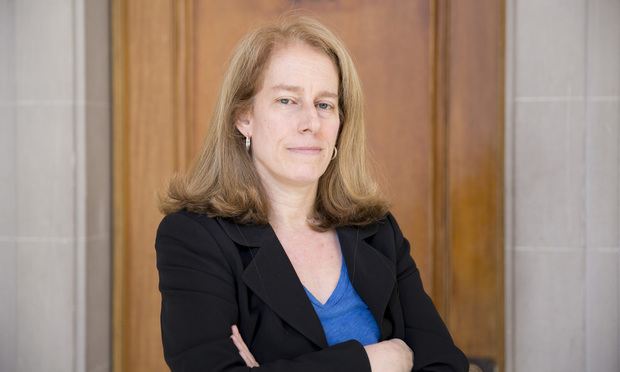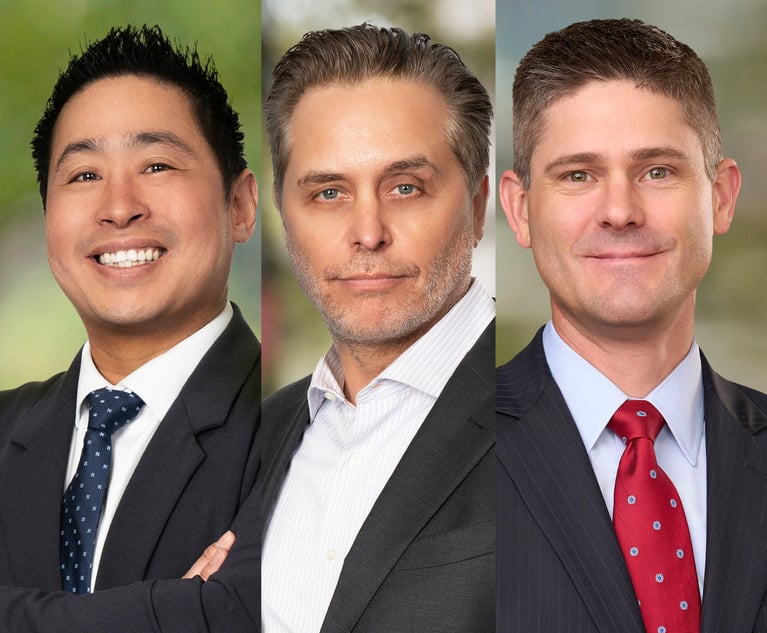As California Passes Landmark Worker Rights Bill, a Familiar Foe Takes Aim at Uber
"Uber's argument doesn't pass the straight-face test, because everyone in California knows that AB5 was intended to apply to the gig economy," said Shannon Liss-Riordan, who filed suit against Uber shortly after California lawmakers passed Assembly Bill 5.
September 12, 2019 at 06:50 PM
7 minute read
 Shannon Liss-Riordan. Photo: Jason Doiy/ALM
Shannon Liss-Riordan. Photo: Jason Doiy/ALM
Shannon Liss-Riordan doesn't seem to hesitate when it comes to suing Uber Technologies Inc.
The name partner of Boston's Lichten & Liss-Riordan, a frequent and longtime courtroom nemesis of the ride-hailing company, sued Uber once again Wednesday evening shortly after California lawmakers passed Assembly Bill 5. The measure, which codifies a landmark California Supreme Court ruling from last year concerning when workers are employees entitled to protections including the minimum wage and certain benefits, was still awaiting Gov. Gavin Newsom's signature as of publication.
But the law's presumed enactment prompted Uber chief legal officer Tony West to discuss its passage with reporters Wednesday. West said the company has no plans to reclassify Uber drivers as employees, because he thinks they still qualify as contractors under the test laid out in the Dynamex Operations West v. Superior Court decision.
The Recorder on Thursday caught up with Liss-Riordan, who is currently campaigning to unseat longtime Massachusetts U.S. Sen. Ed Markey in the Democratic primary. What follows has been edited for length and clarity.
The Recorder: As of the filing of this lawsuit, and as of now, as far as I know, the bill hasn't been signed by the governor. How is this lawsuit not a bit premature?
Liss-Riordan: So, two things happened yesterday that led me to file this complaint last night: One is that the California legislature has just passed Assembly Bill 5. It is clear to everyone in California and in the California legislature that under AB5 and Dynamex, Uber drivers are employees. AB5 clarifies Dynamex and reinforces it. It's not a change in the law in that respect. Uber, as well as other gig economy companies, have been lobbying intensely to block AB5 from passing, and they failed. Uber and other companies have been lobbying intensely to get an exemption from AB5, and they failed. Everyone knows, including the author of the bill, Lorena Gonzalez, that Uber drivers should be employees and AB5 just enforces it.
Despite all of that, yesterday Uber publicly announced that it's not going to reclassify its drivers as employees in California. Tony West stated very publicly that they are going to continue classifying drivers as independent contractors. So I have brought this case seeking an injunction to order Uber to classify its drivers as employees, which is already the law under Dynamex.
The next question you're going to ask me is "Aren't you barred from doing that because of Uber's arbitration clause?" Yes, I just finished a six-year case against Uber where the whole thing got bogged down in the question of whether Uber could use its arbitration claims in court.
Actually, it was my question after next, but go ahead.
I have two reasons now why we should not be deterred by arbitration clauses in this suit. One: The California Supreme Court in the McGill decision held that arbitration can't be compelled when a party is seeking "public injunctive relief." Public injunctive relief is defined as injunctive relief that benefits not just the party, but the public at large. Now that the California legislature has passed AB5, it is clearer than ever that the proper classification of workers and providing them their rights under the wage laws and the labor code is in the public interest. It's not just in the interest of Uber drivers. It's in the state's interest, because the state is missing out on revenues from payroll taxes and unemployment benefits and workman's compensation. And the state and taxpayers are paying for public assistance for Uber drivers who are sleeping in their cars, because they can't afford housing, because they're not being paid properly. They're not even receiving minimum wage. I've got clients who are sleeping in their cars because they're working 70 hours a week for Uber and they're not making minimum wage—especially after they pay for their car and gas and expenses.
The fact that AB5 has now passed and appears to be heading toward being signed by the governor, simply reinforces that this is an issue of public interest, and Uber has defiantly stated that it's not going to reclassify the drivers.
The second reason, and this is all why I filed this case last night, is there was a decision issued yesterday in the Third Circuit, which held for the first time that drivers who transport passengers may fall under the transportation worker exemption to the Federal Arbitration Act. So, this is new. No court until yesterday had said before that transporting passengers could be interstate commerce. So, based on that as well, I have filed this case in order to seek injunctive relief from the court as well as damages for the drivers who have not had their expenses reimbursed and have not received their proper wages under California wage laws.
You say in the opening of the new complaint that Uber is a car service. Uber's Tony West, whom you mentioned earlier, echoed a familiar refrain in the call with the press yesterday after the bill's passage that Uber is a technology company. Is that where one of the fronts of this fight is going to be?
Yes. Uber's argument doesn't pass the straight-face test, because everyone in California knows that AB5 was intended to apply to the gig economy. That's why Uber fought so hard to block the law. That's why Uber fought so hard to be exempt from the law and it failed.
The judge in my case, O'Connor v. Uber, Judge [Edward] Chen rejected Uber's argument that it was a technology company and not a transportation company. A federal court in California has already rejected this argument that Tony West tried to make yesterday as a "Hail Mary" because they didn't succeed in getting the law blocked or in getting an exemption carved out for the gig economy.
This bill clearly has the gig economy's attention. Who else should be concerned about it?
Employers throughout California who are misclassifying their workers.
When last one of my colleagues checked in with you, you were stepping back a bit from your day-to-day practice to pursue a Senate bid. Where's that stand?
I'm running for the U.S. Senate in Massachusetts, and this is why I'm running for the U.S. Senate: Because workers' voices need to be heard in Washington, because this fight needs to go nationwide, because workers need to get their rights under the wage laws. They need to be protected. They need to be treated fairly. I'm all in. I'm running for the U.S. Senate, and this only deepens and strengthens my resolve.
Read more:
Uber's Top Lawyer Vows Fight as California Embraces Sweeping New Labor Rules
3rd Circuit Vacates Arbitration Order in Uber Drivers' Job Classification Lawsuit
Late Changes to California Labor Bill Would Empower City Attorneys
Big Law Partner Joins Lobbying Blitz Against Pro-Employee 'Dynamex' Bill
Uber Foe Shannon Liss-Riordan Dials Back Employment Practice for US Senate Run
This content has been archived. It is available through our partners, LexisNexis® and Bloomberg Law.
To view this content, please continue to their sites.
Not a Lexis Subscriber?
Subscribe Now
Not a Bloomberg Law Subscriber?
Subscribe Now
NOT FOR REPRINT
© 2025 ALM Global, LLC, All Rights Reserved. Request academic re-use from www.copyright.com. All other uses, submit a request to [email protected]. For more information visit Asset & Logo Licensing.
You Might Like
View All
K&L Gates Files String of Suits Against Electronics Manufacturer's Competitors, Brightness Misrepresentations
3 minute read
California Court Denies Apple's Motion to Strike Allegations in Gender Bias Class Action

White & Case KOs Claims Against Voltage LLC in Solar Companies' Trade Dispute

Trending Stories
- 1Pogo Stick Maker Wants Financing Company to Pay $20M After Bailing Out Client
- 2Goldman Sachs Secures Dismissal of Celebrity Manager's Lawsuit Over Failed Deal
- 3Trump Moves to Withdraw Applications to Halt Now-Completed Sentencing
- 4Trump's RTO Mandate May Have Some Gov't Lawyers Polishing Their Resumes
- 5A Judge Is Raising Questions About Docket Rotation
Who Got The Work
J. Brugh Lower of Gibbons has entered an appearance for industrial equipment supplier Devco Corporation in a pending trademark infringement lawsuit. The suit, accusing the defendant of selling knock-off Graco products, was filed Dec. 18 in New Jersey District Court by Rivkin Radler on behalf of Graco Inc. and Graco Minnesota. The case, assigned to U.S. District Judge Zahid N. Quraishi, is 3:24-cv-11294, Graco Inc. et al v. Devco Corporation.
Who Got The Work
Rebecca Maller-Stein and Kent A. Yalowitz of Arnold & Porter Kaye Scholer have entered their appearances for Hanaco Venture Capital and its executives, Lior Prosor and David Frankel, in a pending securities lawsuit. The action, filed on Dec. 24 in New York Southern District Court by Zell, Aron & Co. on behalf of Goldeneye Advisors, accuses the defendants of negligently and fraudulently managing the plaintiff's $1 million investment. The case, assigned to U.S. District Judge Vernon S. Broderick, is 1:24-cv-09918, Goldeneye Advisors, LLC v. Hanaco Venture Capital, Ltd. et al.
Who Got The Work
Attorneys from A&O Shearman has stepped in as defense counsel for Toronto-Dominion Bank and other defendants in a pending securities class action. The suit, filed Dec. 11 in New York Southern District Court by Bleichmar Fonti & Auld, accuses the defendants of concealing the bank's 'pervasive' deficiencies in regards to its compliance with the Bank Secrecy Act and the quality of its anti-money laundering controls. The case, assigned to U.S. District Judge Arun Subramanian, is 1:24-cv-09445, Gonzalez v. The Toronto-Dominion Bank et al.
Who Got The Work
Crown Castle International, a Pennsylvania company providing shared communications infrastructure, has turned to Luke D. Wolf of Gordon Rees Scully Mansukhani to fend off a pending breach-of-contract lawsuit. The court action, filed Nov. 25 in Michigan Eastern District Court by Hooper Hathaway PC on behalf of The Town Residences LLC, accuses Crown Castle of failing to transfer approximately $30,000 in utility payments from T-Mobile in breach of a roof-top lease and assignment agreement. The case, assigned to U.S. District Judge Susan K. Declercq, is 2:24-cv-13131, The Town Residences LLC v. T-Mobile US, Inc. et al.
Who Got The Work
Wilfred P. Coronato and Daniel M. Schwartz of McCarter & English have stepped in as defense counsel to Electrolux Home Products Inc. in a pending product liability lawsuit. The court action, filed Nov. 26 in New York Eastern District Court by Poulos Lopiccolo PC and Nagel Rice LLP on behalf of David Stern, alleges that the defendant's refrigerators’ drawers and shelving repeatedly break and fall apart within months after purchase. The case, assigned to U.S. District Judge Joan M. Azrack, is 2:24-cv-08204, Stern v. Electrolux Home Products, Inc.
Featured Firms
Law Offices of Gary Martin Hays & Associates, P.C.
(470) 294-1674
Law Offices of Mark E. Salomone
(857) 444-6468
Smith & Hassler
(713) 739-1250






